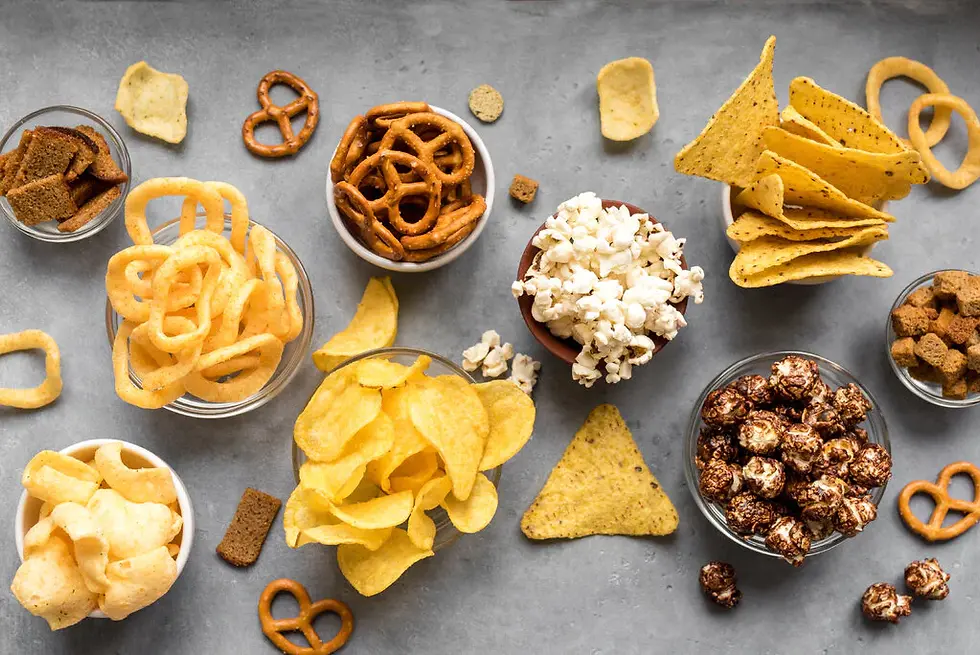How to stop snacking
- Charlotte

- Jan 11, 2023
- 4 min read
I was stood in the garage near the gym, waiting to pay for my coffee. I was surrounded by sweets, chocolate, biscuits, cakes and snacks. It felt like I was submerged in a mass of brightly coloured, highly processed sugar - a bit like in Charlie and the Chocolate Factory - but not as fun! I just thought 'wow - no wonder we have such an issue with obesity, diabetes and other diseases in this country'. I know the issue is much more complex and it just isn't about food, but the amount of high calorie, low nutrition foods readily available to us certainly doesn't help.
Maybe I am hyper-aware of the amount of sugary foods around as I'm not eating any of them and haven't done for over 6 weeks. It actually made me feel a little bit sick looking at it all. Over the past few weeks I've stopped snacking like I used to. I can't just stick a bagel in the toaster or grab a protein bar when I'm in between clients. If I've felt hungry in between meals, I've grabbed some fruit or nuts. The 75 Hard Challenge has enabled me to change my eating habits and by default I've stopped snacking.
I often get asked, what can I have as a healthy snack, or how can I stop snacking? Most people probably don't want to do the 75 Hard, so instead, what else can we do to stop snacking? Here are my top tips:
Fill up on protein and veg.
It's not sexy I know, but often we feel the need to snack because our main meals aren't satisfying. Simply adding more protein and veg to every meal helps with satiety, leaving you feeling full and satisfied after your meals. Increasing veg intake, also increases the amount of macronutrients (vitamins and minerals) you consume which help to build a more robust immune system and a healthier gut. Don't just go for lettuce, cucumber and tomato! Salad looks pretty but isn't very filling. Think broccoli, spinach, pak choi, kale, cabbage, carrot, pepper, green beans, courgette etc.
I can guarantee that if your main meals are giving you enough energy and helping to keep your blood sugar levels nice and stable, you'll be less likely to reach for the biscuit tin in between meals!
Schedule the high-calorie 'non-negotiables'!
If your diet is too restrictive at some point you'll cave in and eat the entire bag of Cadbury's Caramel Nibbles! (That's just my 'go-to'!). In a share bag there's 242g and a whopping 1,200 calories, 63 grams of fat and 125 grams of sugar. However, in 8 nibbles there's 119 calories, 6.3 grams of fat and 13 grams of sugar. So if Caramel Nibbles is your non-negotiable, you could decide how many nibbles would satisfy the craving and schedule it in. For example, on a Monday, Wednesday and Friday, you could have 4 nibbles. If they're scheduled in, you can look forward to them and remind yourself of that when you feel hand wandering towards the biscuit tin (or wherever you store the high calorie snacks in your house). When you eat them, it's important that you really savour that moment and eat mindfully. When you do this, you're more likely to feel satisfied and less likely to binge eat.
By doing this, you'll feel much more in control and you'll start to nurture a better relationship with your food choices.
Re-assess your goals and purpose.
Goals are your reason for changing. They are individual to you and must be relatable and specific. If your goal is too vague and broad, it won't be a compelling enough reason for you to change your habit. For example, a broad goal could be 'I want to lose weight and feel better about myself'. That's a pretty general goal that lots of people could have. But what's your 'why'? It could be 'I want to be able to wear my favourite jeans, look in the mirror and smile because I like what I see'. Why don't you like what you see now? What does it feel like? It's important to feel that pain because it helps to motivate you to do your daily habits and to stick to the plan when the day doesn't pan out the way you want it to.
When you work out your why, write it down and keep it somewhere that you'll see it every day. This reminder will help to steer you in the right direction.
The 3 P's: Plan. Prepare. Prioritise.
When we're tired, stressed out and hungry, we create a perfect storm for snacking and bingeing on high calorie, low nutrition foods. The main fuel for the brain is glucose and when we're tired or stressed, instant gratification comes from sugar. We all feel the push and pull of a busy, demanding life and sometimes it can feel like we're a duck - calm and serene on the surface but paddling like hell underneath! Scheduling in some time to plan and prepare food can save time and stress throughout the week. If we're tired, it's much easier to make good food choices if it's already in the fridge or freezer and ready to stick in the microwave! If we have a plan, we're more likely to look forward to our meals and less likely to think about snacking in between (as long as they full of protein and veg!). As a consequence, we might feel a little bit less duck like!!





Comments